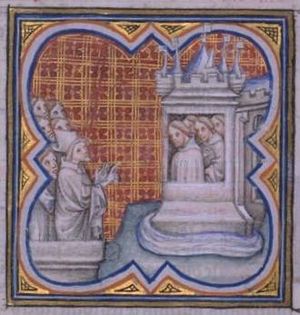
Robert le Coq
Encyclopedia

Le Coq belonged to a bourgeois family of Orléans
Orléans
-Prehistory and Roman:Cenabum was a Gallic stronghold, one of the principal towns of the Carnutes tribe where the Druids held their annual assembly. It was conquered and destroyed by Julius Caesar in 52 BC, then rebuilt under the Roman Empire...
, where he first attended school before coming to Paris. In Paris he became advocate to the parlement (1347); then John II
John II of France
John II , called John the Good , was the King of France from 1350 until his death. He was the second sovereign of the House of Valois and is perhaps best remembered as the king who was vanquished at the Battle of Poitiers and taken as a captive to England.The son of Philip VI and Joan the Lame,...
appointed him master of requests, and in 1351, a year during which he received many other honors, he became bishop of Laon. At the opening of 1354 he was sent with the cardinal of Boulogne, Peter I, Duke of Bourbon
Peter I, Duke of Bourbon
Peter I of Bourbon was the second Duke of Bourbon, from 1342 to his death.Peter was son of Louis I of Bourbon, whom he also succeeded as Grand Chamberlain of France, and Mary of Avesnes....
, and Jean VI, count of Vendôme, to Mantes to treat
Treaty of Mantes
The Treaty of Mantes was affirmed between Charles II of Navarre and John II of France on 22 February 1354. After Charles began negotiating with Edward the Black Prince and Henry of Grosmont, John II, in order to secure his alliance against England, sent Robert le Coq to Mantes to negotiate his own...
with Charles the Bad
Charles II of Navarre
Charles II , called "Charles the Bad", was King of Navarre 1349-1387 and Count of Évreux 1343-1387....
, king of Navarre
Navarre
Navarre , officially the Chartered Community of Navarre is an autonomous community in northern Spain, bordering the Basque Country, La Rioja, and Aragon in Spain and Aquitaine in France...
, who had caused the constable, Charles d'Espagne, to be assassinated, and from this time dates his connection with this king.
At the meeting of the estates
French States-General
In France under the Old Regime, the States-General or Estates-General , was a legislative assembly of the different classes of French subjects. It had a separate assembly for each of the three estates, which were called and dismissed by the king...
which opened in Paris in October 1356 le Coq played a leading role and was one of the most outspoken of the orators, especially when petitions were presented to the dauphin Charles
Charles V of France
Charles V , called the Wise, was King of France from 1364 to his death in 1380 and a member of the House of Valois...
, denouncing the bad government of the realm and demanding the banishment of the royal councillors. Soon, however, the credit of the estates having gone down, he withdrew to his diocese, but at the request of the bourgeois of Paris he speedily returned. The king of Navarre had succeeded in escaping from prison and had entered Paris, where his party was in the ascendant; and Robert le Coq became the most powerful person in his council. No one dared to contradict him, and he brought into it whom he pleased. He did not scruple to reveal to the king of Navarre secret deliberations, but his fortune soon turned. He ran great danger at the estates of Compiègne in May 1358, where his dismissal was demanded, and he had to flee to Saint-Denis
Saint-Denis
Saint-Denis is a commune in the northern suburbs of Paris, France. It is located from the centre of Paris. Saint-Denis is a sous-préfecture of the Seine-Saint-Denis département, being the seat of the Arrondissement of Saint-Denis....
, where Charles the Bad and Étienne Marcel
Étienne Marcel
Etienne Marcel was provost of the merchants of Paris under King John II, called John the Good .Etienne Marcel was born into the wealthy Parisian bourgeoisie, being the son of the clothier Simon Marcel and his wife Isabelle Barbou...
came to find him. After the death of Marcel, he tried, unsuccessfully, to deliver Laon, his episcopal town, to the king of Navarre, and he was excluded from the amnesty promised in the treaty of Calais (1360) by King John to the partisans of Charles the Bad. His temporalities had been seized, and he was obliged to flee from France. In 1363, thanks to the support of the king of Navarre, he was given the bishopric of Calahorra in the kingdom of Aragon
Aragon
Aragon is a modern autonomous community in Spain, coextensive with the medieval Kingdom of Aragon. Located in northeastern Spain, the Aragonese autonomous community comprises three provinces : Huesca, Zaragoza, and Teruel. Its capital is Zaragoza...
, which he administered until his death in 1373.

